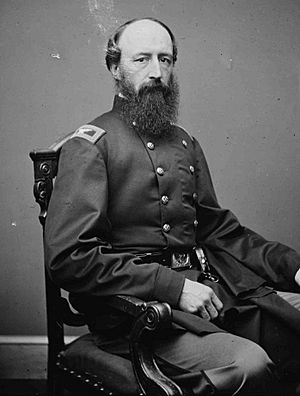John Lafayette Riker facts for kids
Quick facts for kids
John Lafayette Riker
|
|
|---|---|

John Lafayette Riker
|
|
| Born | August 15, 1824 Manhattan, New York |
| Died | May 31, 1862 (aged 37) Fair Oaks, Virginia |
| Place of burial |
Green-wood Cemetery, Brooklyn
|
| Allegiance | United States |
| Service/ |
United States Army |
| Rank | |
| Commands held | Anderson Zouaves Sixty-second New York State Volunteers |
| Battles/wars | American Civil War |
John Lafayette Riker (born August 15, 1824 – died May 31, 1862) was an American lawyer. He became an officer in the Union Army during the American Civil War. Riker bravely fought in the war. He was killed during the Battle of Fair Oaks. This battle was part of the Peninsula Campaign.
Early Life and Family
John L. Riker was born in Manhattan, New York City. His father, James Riker (Sr.), was a merchant and landowner. He also served as a New York City alderman. His mother, Elizabeth Van Arsdale, had a famous father. He was Captain John Van Arsdale. Captain Van Arsdale fought in the American Revolutionary War.
John Lafayette was the younger brother of James Riker. James was a well-known New York genealogist. He wrote several books about New York history. These included History of Harlem (1881).
John L. Riker may have been named "Lafayette" by his grandfather. This was in honor of General Lafayette. Lafayette arrived in New York on the day Riker was born. His grandfather, John Van Arsdale, had served with Lafayette. He met Lafayette again the day after Riker's birth.
Van Arsdale was part of the Veteran Corps of Artillery. They welcomed General Lafayette at the Battery. Lafayette recognized Van Arsdale after many years. This made Van Arsdale very happy. He then named his new grandson "John Lafayette."
In the 1840s, Riker married his cousin, Anna E. Elder. They had two children: Anna E. Riker and John L. Riker Jr. Sadly, his wife Anna died in 1851. His young son, John L. Riker Jr., also passed away in 1854.
John L. Riker studied law. He became a lawyer in New York in 1860. He started his law practice. But he stopped soon after the Civil War began. He joined the army to help his country.
Joining the Civil War
Riker joined the Union Army on April 19, 1861. He enlisted in Saltersville, New Jersey. He was made a colonel of a volunteer regiment. This group was first called the Anderson Zouaves. Riker had helped create this regiment in New York. It was named after Major Robert Anderson. Major Anderson was known as "the hero of Fort Sumter."
Riker and his regiment left "Camp Astor." This camp was on Riker's Island. They went to Washington, D.C., on August 21, 1861. They became part of the Army of the Potomac.
In early 1862, Riker faced a court-martial. He was found innocent of the charges. After this, Riker was able to lead his regiment again.
Leading His Regiment
Riker led his men to Fortress Monroe in March 1862. This was part of McClellan's Peninsula Campaign. Riker led his regiment into battle. They fought at the Battle of Williamsburg. They also fought at the Battle of Fair Oaks in May 1862.
Riker was killed in action at the Battle of Fair Oaks. This happened on May 31, 1862. He was leading his regiment at the time. His last words were "Boys, we're surrounded—give them the cold steel!"
Several officers brought his body back to New York City. Lieutenant James H. Bradley was one of them. He was Riker's aide.
A Hero's Farewell
Friends of Colonel Riker met on June 7, 1862. They made plans for his funeral. Lieutenant Bradley spoke at the meeting. He described Riker's bravery in battle. He said Riker was calm even in tough situations. Bradley also mentioned that Riker was smoking a cigar. He did not draw his sword when he was hit.
After Riker's death, David John Nevin was promoted. He became the new colonel of the regiment. Oscar Veniah Dayton became the new lieutenant colonel.
Riker's body was displayed at New York's City Hall. On June 10, his body was escorted to Green-wood Cemetery. Colonel James Miller was also buried that day. He was killed in the same battle. Riker's body was placed in a temporary vault. It waited there for a permanent burial spot.
Riker may have been a firefighter before the war. He might have been a member of the Mechanics Hook & Ladder Company No 7. Many members of the Anderson Zouaves were firefighters. Representatives from this company attended his funeral.
Honors
New York's Grand Army of the Republic Post #62 was named after him. This happened in May 1873.
 | William L. Dawson |
 | W. E. B. Du Bois |
 | Harry Belafonte |

